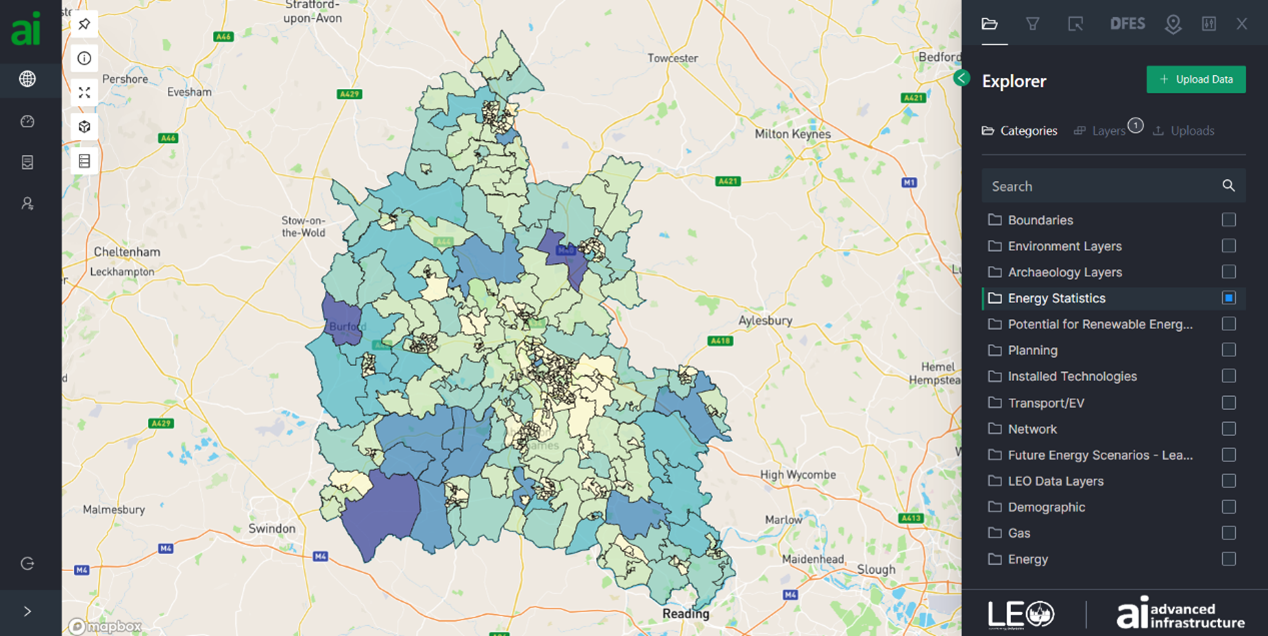An energy system fit for the future
Following their win at APSE’s Annual Service Awards, read the inside story of Oxford’s ambitious energy mapping project.
Oxfordshire County Council is committed to reaching net-zero across our operations and estate by 2030 and to working collectively and at pace with partners to enable Oxfordshire to be net-zero well ahead of 2050.
Transformations in how we use, generate and store electricity will underpin the transition to a net zero energy system. Smart local energy systems will make best use of existing network capacity and help avoid costly network upgrades. Using, generating, and storing electricity flexibly will help to match demand and supply over time, and support the predicted rise in electricity demand (forecast to treble by 2050) as heat and transport decarbonise.
Oxfordshire County Council recognised the key role local authorities could play in this transition, through using our assets and supporting local energy planning.
In 2019 Oxfordshire County Council along with Oxford City Council, Scottish and Southern Electricity Networks, Low Carbon Hub, University of Oxford, Oxford Brookes University and a number of commercial partners came together to create Project LEO, a multimillion-pound initiative, part funded through the Prospering from the Energy Revolution programme, ran over four years to gather evidence to support policy changes and the investment needed to create the technological, financial, and social conditions for successful systemic change.
The project aimed to:
• Test new market and flexibility models – exploring products and services that create new opportunities to benefit from the way we generate, store and use energy in our homes, organisations and communities.
• Advance network capabilities to manage smart flexible energy systems – learning what needs to happen to our electricity networks to make them ready for a change to a local energy system.
• Facilitating local participation in the energy system – ensuring that individuals, households, and organisations are part of the energy transition.
Roles and responsibilities of each of the players were clearly defined at the project outset: Oxfordshire County Council led the development of a Strategic Energy Mapping Platform to support local area energy planning and provided assets to participate in the flexibility trials.
Trialling the future energy system
Project LEO ran a series of increasingly complex trials to explore the potential of various of energy assets (eg, battery, solar PV, buildings) to provide flexibility at a very local level. After reviewing our buildings for suitable electricity loads, Oxfordshire County Library was selected as the best fit for the LEO trials. Here we could shift the time of day the chillers were used away from the evening peak to reduce overall demand on the network, although we needed to make a few changes to our building management system to enable fine control of different parts of the cooling system and incorporate a remote scheduling programme to switch the chillers off and on during the flex trials.
Despite challenges, the trials successfully demonstrated that council assets can participate in local flexibility markets, and if scaled up across the area could make a significant contribution in the transition to a net zero energy system.

Screenshot of the LEO Strategic Energy Mapping Tool
Mapping Oxfordshire’s energy transition
Accessing granular data to understand not just how but where energy is used or generated and how this might need to change as we transition to net zero was identified as a significant challenge for local authorities generally, including Oxfordshire County Council. A strategic mapping tool was needed to bring together geospatial data and support teams across Oxfordshire working to decarbonise.
Drawing on expertise in the wider partnership (and beyond), the County Council commissioned Advanced Infrastructure to help. The resulting LEO Strategic Energy Mapping Platform (built on Advanced Infrastructure’s LAEP+ platform) draws together multiple key datasets (publicly available, held or commissioned by the County Council or other LEO partners, or provided by the Energy Systems Catapult) into a single space to give an accessible overview of energy use and assets in Oxfordshire. New data identifies areas which may be suitable for installation of additional renewables, further datasets identify opportunities for roof top solar, heat pumps and batteries, whilst heat loss imaging helps show areas where energy efficiency programmes may be best targeted.
To ensure the mapping tool was fit for purpose user testing was prioritised throughout development. Colleagues across Oxfordshire’s 6 local authorities identified data, determined functionality, and tested outputs. Their feedback was used to refine the system resulting in the platform being well-received by stakeholders and generating significant interest outside Oxfordshire.
Outcomes and next steps
Project LEO has succeeded in providing a blueprint for the energy system of the future. The project findings have been disseminated widely by the project partners. The team were delighted to be invited to Westminster by Chris Skidmore MP, Chair of the Net Zero Review, to discuss the learnings from the initiative.
One of LEO’s key messages highlighted the vital role of data and mapping for Local Area Energy Planning and recommended LAEPs should be mandatory, convened by local authorities (supported by appropriate resourcing), and dedicated to a ‘whole systems’ approach to identify the best place-based solutions, informed by the priorities of the local community.
The transition to net zero remains a priority for Oxfordshire County Council. We continue working in partnership to develop a Local Area Energy planning approach that makes this priority tangible and manageable.
The LEO energy mapping tool will play a key role in this work. The LAEP+ platform on which it was based continues to be developed by Advanced Infrastructure, working with SSEN and UK Power Networks.
Oxfordshire County Council is proud to have played its part in this successful collaboration. The work we have delivered around energy mapping and energy flexibility has demonstrated the crucial role local authorities can play in the transition to a zero carbon energy system.
Inga Doherty, Climate Policy & Programmes Team Leader, spoke on this topic at a recent Climate Change and Renewable Energy Network meeting on 2 December. The presentation is available to download from the APSE website.



.png)



.png)